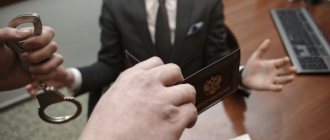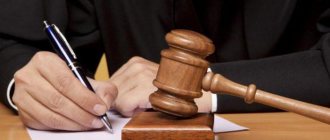In accordance with domestic legislation, organizations and individual entrepreneurs, on a contractual basis, with the appropriate license, can provide both legal entities and individuals with services to protect their interests and rights.
The terms of reference of private detectives and security agencies are determined by a separate law. In practice, there are often cases when employees of such organizations allow themselves much more than is permitted. For abuse of power, the legislator establishes, as actually stated in Article 203 of the Criminal Code of the Russian Federation, criminal liability.
Description of a simple composition
The first part of the criminal law describes the simple elements of the crime. It occurs when an employee of a private security organization (provided he has the appropriate identification) or a private detective carry out actions that go beyond the scope of their powers established by law, and thereby significantly violate the legitimate interests and rights of legal entities and individuals, or the interests states and (or) societies protected by law.
If qualified under part one of Article 203 of the Criminal Code of the Russian Federation, the offender faces punishment in the form of:
- a fine in the amount of 100 to 300 thousand rubles. or in the amount of any income of the convicted person, including salary, for a period from 1 to 2 years;
- restrictions of freedom for a period of up to 2 years;
- forced labor (up to 2 years) with aggravation in the form of deprivation of the right to hold a post in a certain position or perform any specific labor activity for a period of up to 2 years.
Judicial practice under this article
Article 203 of the Criminal Code of the Russian Federation “On Abuse of Power” is rarely used, but it does occur.
Examples of judicial practice on it:
- Citizen G. worked as the head of a private security service. After drinking, he went to work. At this time, a woman came to the office who was dissatisfied with the work of his employees. They quarreled, G. swung his hand and hit the client in the face. She fell and cut her eyebrow. She appealed to the court with a request to punish the culprit. After the investigation, G. appeared in court. He admitted that he had done wrong and apologized. He was sentenced to pay a fine and was deprived of his position.
- Citizen Sh. had a private detective's license and worked with several clients. As part of his job, he needed to keep an eye on his client's wife. One day he was performing his duties, and the client’s wife was attacked. He began to defend her, used a firearm, the criminal was wounded, detained, but sued for causing harm to health. The court considered all the features of the case, took into account that Sh. had a license and the right to carry weapons, considered him not guilty of criminal liability, but ordered him to pay for the treatment of the victim.
- Citizen K. worked for a private security company. His duties included protecting the deputy and ensuring his immunity. One day, he and his client attended a rally; journalists surrounded the deputy and began asking for an interview. He refused and asked K. to help him get through. He accidentally hit the journalist, he fell and broke the camera, and filed a lawsuit. The investigation considered that K. did not exceed his powers and was therefore innocent.
What decisions are made under Article 203?
More often, it results in convictions because some detectives and security guards take their duties too literally. In 2022, there were 11 cases under this article, of which 7 were in 1 part. As a result, 2 people were acquitted, 1 was deprived of liberty, 2 received suspended imprisonment, 5 received restriction of freedom, 2 received a fine. 1 person received compulsory work and another 1 was declared insane.
What are aggravating and mitigating circumstances?
Aggravating circumstances in the form of the use of violence or its threat, or the use of weapons can increase the punishment for a private security guard or detective. Mitigating circumstances are also taken into account separately, a general list of which is given in the code.
Qualifying features
In part two of Article 203 of the Criminal Code of the Russian Federation, the use of weapons or special means replacing them is named as a qualifying sign of a criminal act, which entailed the onset of consequences for the victim, regarded as grave (including death).
The sanction is expressed in the deprivation of liberty of the guilty person for a period of up to 7 years with an additional penalty in the form of a ban on conducting a certain type of activity and holding certain positions for up to 3 years.
Object characteristics
The object of the crime, qualified under Article 203 of the Criminal Code of the Russian Federation, is the procedure established by the legislator for performing private security and detective activities. In addition, it includes the health of citizens who are harmed as a result of illegal actions of employees of these organizations.
Please note that you can familiarize yourself with the procedure in accordance with which private activities (detective and security) should be carried out in the Law of the Russian Federation No. 2487-1, adopted on March 11, 1992.
Characteristics of the objective side
According to Article 203 of the Criminal Code of the Russian Federation, the objective side of the illegal act in question is expressed in the excess of the powers established by law and granted by the relevant license, contrary to the objectives of this type of service.
In accordance with the law, private detectives are prohibited from hiding facts that have become known to them about committed or impending crimes from law enforcement agencies, as well as impersonating police officers and collecting information related to the personal life, religious and political beliefs of individual citizens.
Thus, the perpetrators may be talking about abuse of authority (this is also mentioned in the comments to Article 203 of the Criminal Code of the Russian Federation) if actions prohibited by law are committed (using violence or threats), as well as if the committed acts go beyond the rules defined in a license for the right to carry out activities (security and detective). Any activity of this kind is contrary to the tasks of security or detective services. The powers of a security guard or detective are specified in contracts concluded with clients.
The composition of the article is material. In other words, in order for a crime to be considered completed, a socially dangerous consequence must occur.
Judicial practice: sentences and punishment under Art. 203 of the Criminal Code of the Russian Federation
- Resolution of the Plenum of the Supreme Court of the Russian Federation dated... PLENARY OF THE SUPREME COURT OF THE RUSSIAN FEDERATION DECISION dated December 27, 2002 N 29 ON JUDICIAL PRACTICE IN CASES OF THEFT,...
- Decision of the Supreme Court: Determination N 203-APU17-21... THE SUPREME COURT OF THE RUSSIAN FEDERATION Case No. 203-APU17-21 APPEAL DECISION Moscow August 31, 2022 Judicial Collegium for Military Personnel of the Supreme...
- Resolution of the Plenum of the Supreme Court of the Russian Federation dated... PLENARY OF THE SUPREME COURT OF THE RUSSIAN FEDERATION DECISION of November 15, 2016 N 48 ON THE PRACTICE OF APPLICATION BY COURTS OF LEGISLATION GOVERNING FEATURES...
- Resolution of the Plenum of the Supreme Court of the Russian Federation dated... PLENAUM OF THE SUPREME COURT OF THE RUSSIAN FEDERATION DECISION dated June 25, 2022 N 18 ON JUDICIAL PRACTICE IN CASES OF CRIMES,...
- Decision of the Supreme Court: Resolution No. 310P13 dated... DECISION OF THE PRESIDIUM OF THE SUPREME COURT OF THE RUSSIAN FEDERATION Case No. 310-P13 Moscow January 23, 2014 Presidium of the Supreme Court of the Russian Federation...
- Resolution of the Plenum of the Supreme Court of the Russian Federation dated... PLENAUM OF THE SUPREME COURT OF THE RUSSIAN FEDERATION DECISION dated December 17, 2022 N 43 ON SOME ISSUES OF JUDICIAL PRACTICE IN CASES...
- Resolution of the Presidium of the Supreme Court of the Russian Federation dated... PRESIDIUM OF THE SUPREME COURT OF THE RUSSIAN FEDERATION DECISION dated December 5, 2018 N 126-P18 ON RESUMING PROCEEDINGS IN THE CASE DUE TO NEW...
- Ruling of the ECtHR dated 02/14/2017 EUROPEAN COURT OF HUMAN RIGHTS THIRD SECTION CASE “MASLOVA VS. RUSSIAN FEDERATION” (Complaint No. 15980/12) JUDGMENT…
- Judicial Collegium for Criminal Cases, appeal:... THE SUPREME COURT OF THE RUSSIAN FEDERATION Case No. 72-APU 17-21 APPEAL DECISION Moscow October 04, 2022 Judicial Collegium for Criminal Cases...
- Decision of the Supreme Court: Determination No. 56-КГ16-46 dated... THE SUPREME COURT OF THE RUSSIAN FEDERATION No. 56-КГ16-46 DETERMINATION Moscow March 6, 2017 Judicial Collegium for Civil Cases of the Supreme Court...
Comments on Article 203 of the Criminal Code of the Russian Federation
Exceeding established powers, committed contrary to the tasks assigned to private detective agencies, occurs when the actions of the guilty person are aimed at violating the law or are associated with creating obstacles to the activities of judicial and (or) law enforcement agencies. We also note that, according to the law, persons with a license for detective and security activities have the right to use special means, and the latter also have weapons.
In accordance with the comments to Article 203 of the Criminal Code of the Russian Federation, abuse of power by a security guard has the same legal nature as a similar crime committed by a private detective.
The use of violence or the threat of violence is a qualifying feature specified in part two of the norm. It can be carried out through weapons or special means and entail consequences, including serious ones. The comments define that violence can be expressed in any actions that involve physical impact on the victim: causing pain, harm to health, tying up, handcuffing, etc.
The threat of violence against a person should only be understood as the threat of inflicting any physical force. In case of intimidation by destruction of property or blackmail, qualification under the commented article is excluded.
Second commentary to Art. 203 of the Criminal Code of the Russian Federation
1. The Law of the Russian Federation of March 11, 1992 No. 2427-1 “On private detective and security activities in the Russian Federation” (as amended on December 27, 2009 No. 307-FZ) allows private detective and private security activities, which are regulated by the Instructions on the organization work on licensing and implementation by internal affairs bodies of control over private detective and security activities on the territory of the Russian Federation, approved by Order of the Ministry of Internal Affairs of Russia dated June 19, 2006 No. 447.
Private detective (detective) activities are permitted in the form of providing services listed in Part 3 of Art. 1.1 of the above law. The types of security activities permitted by law are also listed there.
2. The direct object of abuse of power by a private detective or an employee of a private security organization who has a private security guard certificate is the procedure and limits established by the state for the provision of paid security and detective services. An additional object is honor, dignity, bodily integrity and health of citizens.
3. The objective side of the crime is characterized by actions consisting of exceeding the powers granted by a license to engage in private detective or security activities, contrary to the objectives of this activity, if this act entailed a significant violation of the rights and legitimate interests of citizens and (or) organizations or legally protected interests of society or states.
4. The subjective side is characterized by direct intent.
5. The subject is special: it can be a private detective or an employee of a private security organization who has a private security guard certificate.
6. The qualified elements of the crime in question (Part 2) presuppose one of the following aggravating circumstances:
a) use of violence or threat of its use; b) use of weapons or special means; c) the onset of grave consequences.
Special means should be understood as non-weapon technical means and items used to enforce public order and public safety (tear gases, water cannons, rubber sticks, handcuffs, special vehicles, etc.).
The grave consequences of this crime consist of causing grievous harm to health, long-term illness of the victim, or other harm of a similar severity. However, causing grievous harm to the health of the victim under aggravating circumstances requires additional qualification under Part 2 or Part 3 of Art. 111 of the Criminal Code of the Russian Federation.



